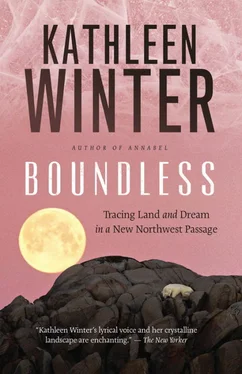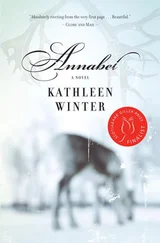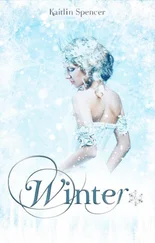There are a lot of disparaging things real musicians have on the tips of their tongues about people with concertinas, and in this regard Nathan was no exception.
“Keep her miles from me, then,” he said. “And hoist her concertina overboard — you gotta nip that kind of torture in the bud.”
I knew Nathan’s father, Stan, had died in a tragic plane mishap when Nathan was about four years old. On our voyage Nathan would sing his father’s beloved song about the Northwest Passage, as well as songs from an extensive world-folk repertoire and compositions of his own. He would also teach the Inuit girls of Pond Inlet how to begin Mongolian throat-singing; but I knew none of this on the Russian bus. I just knew that with his shaven head, his radical tattoos and prickly comments, he looked like someone I might want to give a wide berth.
Our bus had rounded a corner in the crags of Kangerlussuaq, and there in the bay was our ship, floating so crisp and blue and white it looked as if someone had ironed and starched it and stitched it into one of those three-dimensional pop-up picture books that had enchanted me when I was a child. When you open the pages, the world inside the book springs forward with hidden niches and bridges and stairs. Here, twinkling in the Greenland bay with its flags and decks and portholes, was a storybook ship I would come to love and care about as if it were a living being.
I’d spent years in Newfoundland, watching ships from the shore and wishing I was on them. In the distance they’d looked wistful, dreamlike — when their lights twinkled and they floated on the sea, distant and small, how mysterious they appeared, as if made not of substance but of thought and story. Now, as we boarded Zodiacs — motorized dinghies that waited on wet stones then sputtered into noise and spray as the helmsmen jolted us through the choppy water — our ship loomed larger, not a dream at all but muscled and humming from its own deep engine room.
As Noah had mentioned on the phone, the very first Arctic educational voyages had, like this one, been on Russian icebreakers, but melting ice in the North meant that ships going through the Northwest Passage no longer needed to be utilitarian workhorses. Our ship was equipped for icy conditions, but it combined utility with grace. Its flags and decks were bright. On the main decks were several comfortably appointed areas whose simple lines satisfied everyone’s appetite for ruggedness yet still bordered on elegance. In the forward lounge people could sit on expansive corner settees, or have a drink from the bar at small tables gathered around a stage area like a floating cabaret. At mid-ship we had another bar with couches and stools, and songbooks containing some smart person’s best estimate of just about any song we might have wanted. In the dining room at the aft of the ship lay an airy, many-windowed expanse of white tablecloths and glittering stemware. There would be five-course menus that changed daily, as well as a buffet featuring endless slices of smoked Arctic char, yellow figs bobbing in their own syrup, capers and Danish cheeses, marinated peppers, olives, and piles of fresh provisions that Nordic suppliers would replenish in crates stacked on various beaches along our route until they could reach us no more.
“I feel,” I confided to Elisabeth, who attracted me with her quiet, sympathetic air, “a bit like the Jumblies.”
“The Jumblies?”
“Edward Lear’s nonsense poem.” The demented Englishman’s poem had been a favourite of mine since I could read. “He wrote ‘The Owl and the Pussycat,’ too. He wrote limericks. But my favourite is ‘The Jumblies.’ He wrote it not long after the lost Franklin expedition: Their heads are green, and their hands are blue, / And they went to sea in a Sieve — a bit like Franklin, and their provisions were astonishing, like ours — And forty bottles of Ring-Bo-Ree, / And no end of Stilton Cheese .”
Elisabeth laughed. I sensed that her mind stretched into enigmatic places — felt she had made herself a quiet sentinel, on guard for any ambush of curious news, and would remain calm in any circumstance. I liked this very much. She was slender and her hair floated in a cloud of curls that she tried to keep somewhat tame under a little beret. Next to her I was a bit of a clodhopping galoot, but I was used to that.
It was time to go downstairs to my cabin, number 108, and I realized on the narrow staircase that things below the main deck grew progressively less ornamental and plainer, more robust, in the descent. The air grew warmer, the passage walls more confining. The doors were small and some were made of metal, and the farther down I went, the louder came the thrum of industrial noise from the engine room. Higher up, through open doors, I had seen passengers’ deluxe cabins with big windows looking out over Baffin Bay. By the time I descended to my own little cabin, there were tiny portholes, and when I pressed my nose to the glass, there lay the sea surface, at the level of my rib cage. I did not mind any of this: I found that the thrumming noise, with its accompanying vibrations, comforted me immensely. I was a small animal nestling ever closer to the heart of its mother, and we were setting off for the Northwest Passage — land of fables, channel of dreams.
CHAPTER THREE
Viking Funeral
I LOVED MY cabin. It was in the bowels of the ship next to a door painted with the letters WTD — would later find out what that meant, and would be unsure whether to be comforted or terrified by it. The cabin was tidy, with a sink and shower, and lamps that let my cabin mate and me read and make notes without disturbing each other’s sleep. My cabin mate was the young leader of the small Japanese expedition, and she worked night and day as their translator. If we rose at six-thirty for an early anchorage and expedition by Zodiac, Yoko got up before six. If the northern lights put on a show that meant everyone stayed up until midnight, she stayed up long past that, then wrote expedition notes on her laptop for another hour. Everyone on the staff worked conscientiously like this, but she kept some of the longest hours and displayed utter seriousness.
A lot of the time she was not in the cabin, which meant that, as a reclusive writer, I had it gloriously to myself. I could lie on my bunk and play my concertina, or kneel on the pillow and look out the porthole at the water mere inches from my face. I loved the fact that when I stood on the cabin floor, my body was below sea level. And when the ship moved, when we had broken anchor and were away, I gave in to that feeling of landlessness beneath the body. While the ship tilted and the cabin hummed and shook with the engine, when the sea and clouds beyond our porthole started moving and the bit of Greenland we’d stood upon became a ribbon, then a fainter ribbon, then a line of dream-substance in the distance, I knew that being on a ship headed for Baffin Bay was a thing I’d longed for, unbeknownst to myself, all these years of hobbling on rock and boulder and valley. A Pisces, I was now in my marine element, and I wanted the journey to be endless.
There’s a womb-like aspect to being in a cabin in a ship’s belly, especially at night, when you are lying in the bunk before sleep comes. The cabin is so small that it would not be an acceptable size if it were on the ground, but because the ocean sways beneath, you feel an old feeling that might be the feeling of floating in amniotic fluid, and the walls can close in all they want: the ship is your mother, whose organs cradle you, and she is breathing. I wondered how I’d ever sleep on land again.
This floating away from the shore came not long after another, shorter sea voyage in which I’d begun to understand how the sea can wipe away the tumult of difficult times on land. Through the years of my first husband’s illness, a malaise had entered me and nothing had been able to cure the root of it. I’d kept the small house where we’d lived with our daughter at the foot of a mountain called Butter Pot. The mountain often had a dusting of snow, the moon and stars illuminating its whiteness. A stream ran under our window and in summer, marsh toads and hermit thrushes gave the water music funny bass notes and sent mysterious bars of song — “Carambola! Carondelet!” — receding over the spruce and fir tops. The snipe in June made another sound: reaching great heights over the bog they would plummet, air winnowing through their tailfeathers with a phantom tone.
Читать дальше












